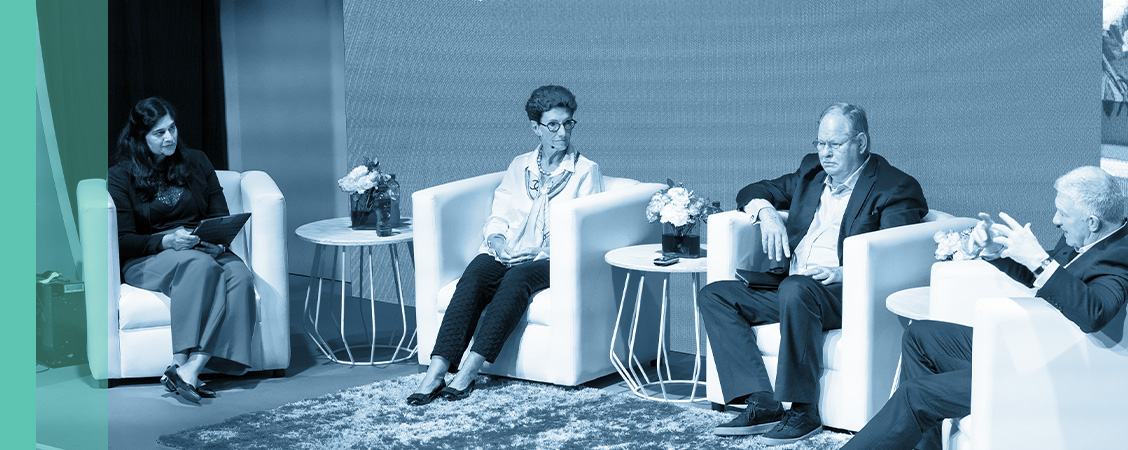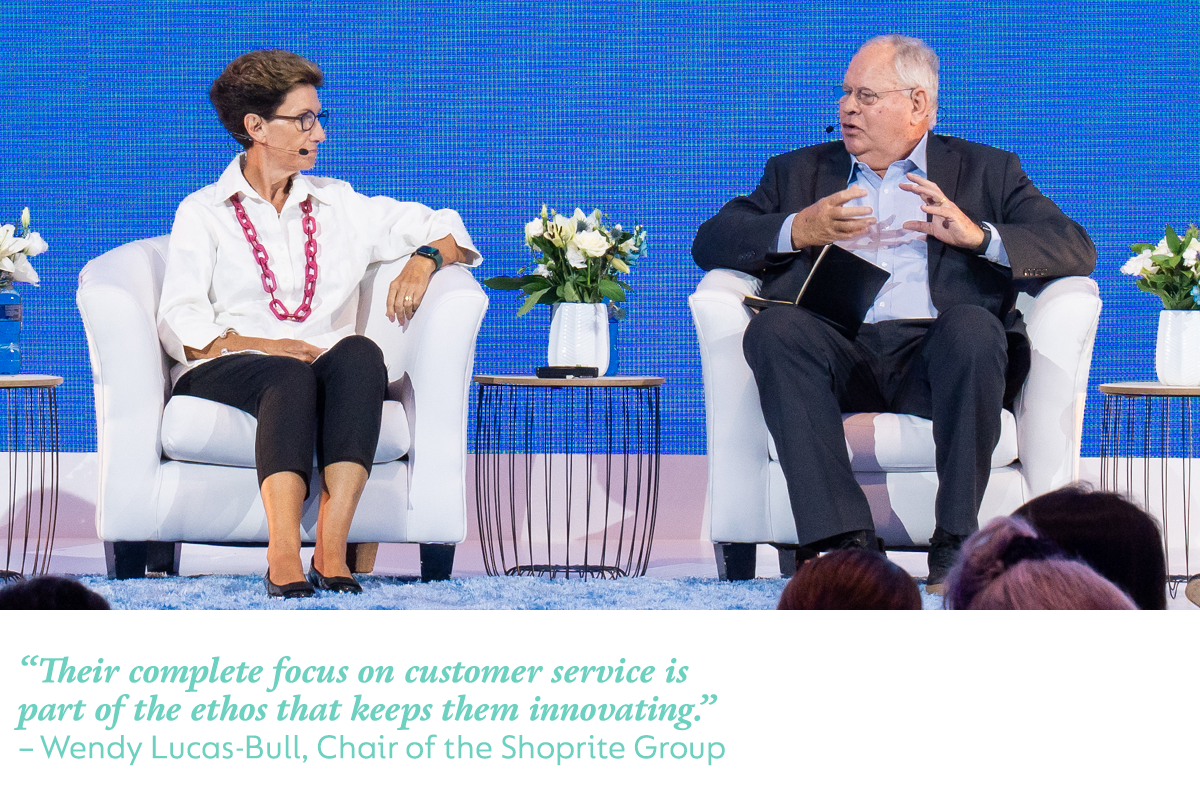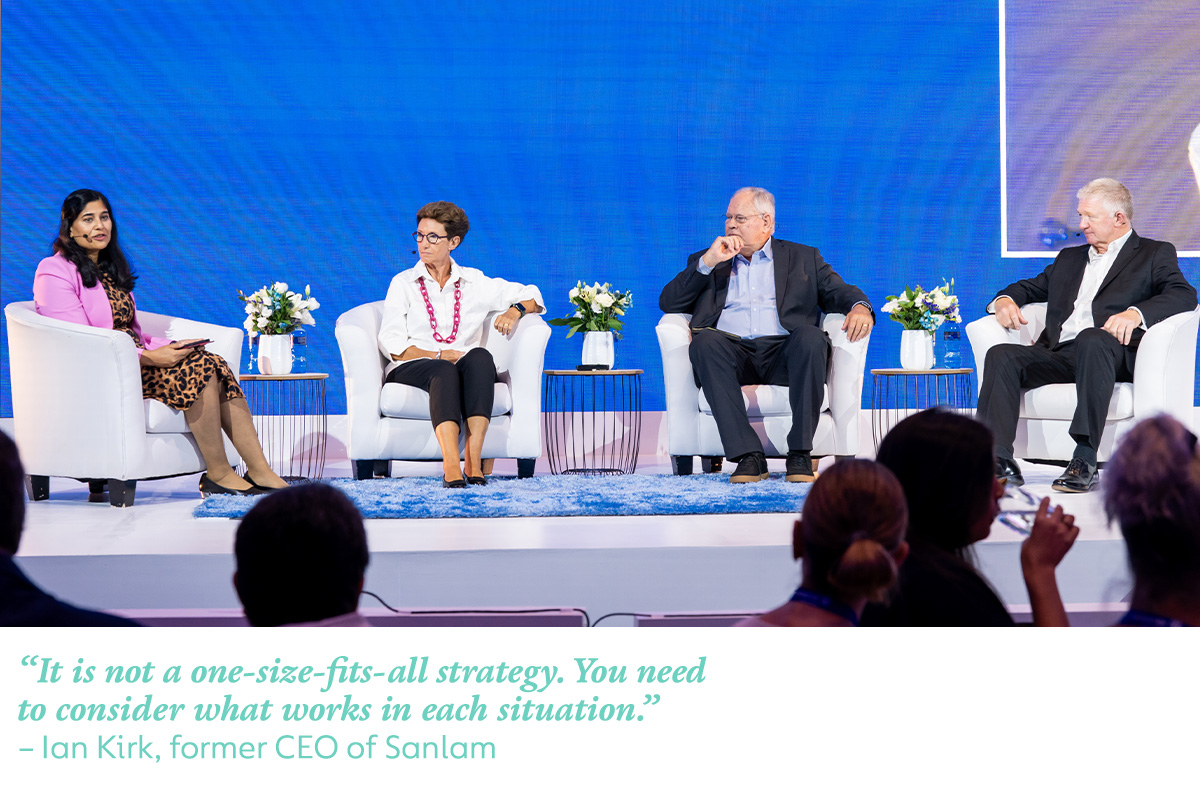
Business & Industry views
From obstacles to opportunities
The nitty gritty of running a business in developing countries
At Coronation’s annual thought leadership conference, Talking Investments, Pallavi Ambekar spoke to a distinguished panel of South African business veterans who shared insights into the intricacies of operating businesses in developing countries. The following is an edited summary of these thought-provoking sessions.
Pallavi: Given your diverse experiences, each of you will offer different perspectives on how you navigated the opportunities and challenges encountered throughout your careers. Let’s start by establishing the framework behind your thinking.
Laurie, could you walk us through two defining moments in your career. Firstly, in 1977, when you co-founded Rand Consolidated Investments (the predecessor of RMB) with R10 000 in your pocket; and secondly in 1998, when the opportunity arose to acquire First National Bank. Not only did you put your own money on the line, you also raised R5 billion from external investors. Could you provide insights into your mindset at these two very different times? Were you aware of the economic environment, and were you taking that into consideration?
Laurie: Let’s go to 1977. We had only one product, which was a mechanism of financing public utilities and municipalities. As a startup, we did not give the political economic situation a single thought because it really was irrelevant to our decision to start this company and whether we were going to be a success. We were very confident because we knew the product was good. The competitive products were way inferior.
Fast forward to 1998, but pause in 1994, when South Africa became a democracy. One thing that we got right was realising that investment banks would enter South Africa and compete with RMB, which is exactly what happened. We thought it was unlikely that retail banks would enter South Africa because retail banking doesn't travel well. Therefore, we believed that at some stage, we needed a retail banking strategy.
Then came 1998, when we approached Anglo American to sell Southern Life to us, which was ailing at the time. They wanted to go back to pure mining, so they agreed to sell Southern Life, but we had to take FNB as well. Whoa! It was multiple times our size. But we realised it was a once in a lifetime opportunity to buy one of the big four banks in South Africa. If we hadn’t developed a retail banking strategy mindset back in ’94, we would probably not have taken the plunge.
With regard to other people’s money, when we think of shareholders, we don’t consider them differently than we consider ourselves. Obviously, if most of your assets are invested in that company, you look after the shareholders because you are looking after yourself.

Pallavi: One of the key ways of expanding into Africa is through partnerships. Ian, as the CEO of Sanlam, you entered the African market through partnerships. Why did you choose to enter with local partners, and what insights and knowledge did they bring to the table?
Ian: What the local people brought was an established business, and what we brought was technical expertise and an ability to scale that local business. Entities will only partner with you if they can see that you can really add value that they can’t add themselves, and you have to demonstrate a track record of doing so.
The other point that I’d like to make is that it is not a one-size-fits-all strategy. You need to consider what works in each situation. Partnering is difficult, and the entire organisation needs to be committed to it.
Pallavi: Let’s discuss what happens when the partnership doesn’t work out. Wendy, when Barclays unexpectedly pulled the plug on Absa, how did you manage that curveball?
Wendy: It was a very large egg to unscramble. The size of the settlement, after a lot of arm wrestling, was indicative of the size of the systems, processes and brands involved, and the amount of work that needed to be undertaken during that period. But Absa navigated through this successfully and although it distracted them inwardly for more than a year, it actually built significant muscle, resilience and confidence. As a result, the outcome has been a stronger entity.
Pallavi: Laurie, was FirstRand concerned or worried that they would be under threat in South Africa with the Absa Barclays partnership?
Laurie: You should always have a healthy respect for competition and never get over confident or complacent. But if you fear competition, then why are you there? We did take the threat seriously, but we also felt we would be able to compete. One error we made, in hindsight, was not taking Capitec seriously enough.
Pallavi: You walked away from some big acquisitions in Africa. Could you elaborate on your thought process, and explain your view?
Laurie: When we acquired FNB it already owned banks in Namibia, Botswana, Swaziland and Lesotho. We looked into potential acquisitions, but the price was wrong. The first time Nigeria came up as a potential destination, the board was quite hesitant to take the plunge. It’s a rough neighbourhood, not an easy environment in which to operate. When one of our board members said, “You don’t find gold under the Eiffel Tower,” that took the board over the line. So we are there, but just with RMB. FirstRand’s strategy has been to enter some markets, but it is not easy. Another way to enter a country is to start small and get to know the country, perhaps by establishing a microlender, for example, rather than a fully-fledged bank.
Pallavi: Let’s focus on your role as chair of Shoprite, Wendy. It’s a remarkable business that continues to thrive despite a stagnant economy. In its most recent trading update, it reported a topline growth of 14%. How does the management achieve such growth in this environment?
Wendy: It is a testament to the fact that they are a world class team. Over time, with this growth, they have become systemically important to South Africa. We are essential for food security, we’re the biggest private sector employer in South Africa and now we are the first responder with Gift of the Givers when there is a crisis. They take that responsibility extremely seriously. Their unwavering focus on customer service is part of the ethos that keeps them innovating.

Whether it is innovating at the top end of the market with Sixty60, or innovating to keep our R5 bread still at R5, the drive comes from an absolute dedication to customers first and uplifting the lives of customers and communities.
Pallavi: What was the best investment or business advice you have ever received, and from whom?
Wendy: A simple principle that has stood my partners and myself at Peotona in good stead is to never invest alongside anybody if there are doubts about their integrity or if we don’t share their values.
Laurie: I greatly admire Warren Buffett and the deceased Charlie Munger. I've been to about seven of their AGMs. It took them a long time to invest in any tech stocks, and Buffett made a very telling remark to explain why. He said it was because he couldn’t figure out which one of the big tech stocks would be sustainable. Another important point he emphasised was that he wanted to buy stuff that he could hold forever – for the long term. We have always applied long-term thinking as well.
Ian: I’m going to split the question in two parts – investment advice and business advice. The best investment advice was: don’t invest in something that you don’t really fully understand, and that advice came from my wife after I had a disastrous investment in a restaurant and pub. On the business side, the advice came from one of my colleagues at Capital Alliance, Gary Burg. He said: don’t sweat the small stuff, but make sure you can operate at both levels. You need to understand what is important strategically and get those calls right, but when you need to dive, you must be able to dive (into the detail).
BIOGRAPHIES:
Wendy Lucas-Bull is a seasoned South African banker and investor. She currently serves as Chair of Shoprite, the largest retailer in Africa, and was previously the Chairman of the Absa Group, Absa Bank and Absa Financial Services. Other former non-executive directorships include those at Barclays PLC and Barclays Bank PLC, Nedbank, Anglo American Platinum, Development Bank of Southern Africa, Dimension Data PLC, Alexander Forbes, Aveng (Deputy Chairman), Lafarge Industries SA (Chairman), Eskom, Momentum Group, Discovery Holdings, Telkom SA and the South African Financial Markets Advisory Board. She was also Executive Director of Rand Merchant Bank Holdings, Chief Executive of FirstRand Retail, which included First National Bank, WesBank, Outsurance and Firstlink, and an international partner at Andersen Consulting, now Accenture. She is also a founding director at Peotona Group Holdings, a women’s investment and development group.
Laurie Dippenaar is an iconic South African businessman and founder of FirstRand, the largest financial services group, by market capitalization, on the African continent. During his 40-year career in the financial services industry, Laurie served as Chairman of various companies in the Group, including Momentum Life, OUTsurance, Discovery, FNB, Rand Merchant Bank and FirstRand, all pillars of South African business. Laurie also served on the Governing bodies of various educational institutions, including more than two decades as a Member of the Council of the University of Pretoria. He served as President of Business Leadership of South Africa for two years and chaired the Centre for Development and Enterprise, one of South Africa’s best-known think tanks, for fifteen years. In 2023, he received an honorary doctorate from the University of Pretoria.
Ian Kirk is a multi-board director and prominent leader in the financial sector in South Africa. Formerly at the helm of Sanlam, the largest insurance company in Africa, and its subsidiary Santam, the leading short-term insurer in South Africa, Ian currently holds board positions at prominent entities such as the JSE, Pepkor, Transaction Capital, Netcare, SCOR (UK) and Shriram (India). Additionally, Ian also serves on the Presidential State-Owned Enterprise Council, mandated to reposition South Africa’s state-owned enterprises. In the earlier phase of his career, Ian spearheaded the formation of the Insurance Specialist Services group at PriceWaterhouse in South Africa. Subsequently, he was appointed managing director of the life insurer AGA Holdings, which later restructured as Capital Alliance Holdings Limited, one of the first broad-based black empowerment financial services companies in South Africa. In December 2004, Capital Alliance Holdings was sold to Liberty Group and Ian was appointed Deputy CEO of Liberty Group in March 2005.
Disclaimer
SA retail readers
SA institutional readers
Global (ex-US) readers
US readers
 South Africa - Institutional
South Africa - Institutional

